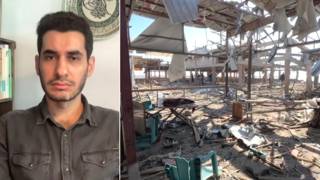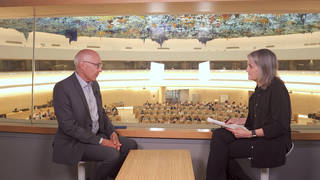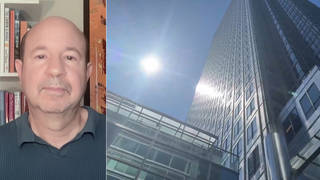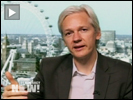
Guests
- Julian Assangefounder and editor-in-chief of WikiLeaks. He was granted political asylum by Ecuador last year and sought refuge almost a year ago at the Ecuadorean embassy in London because the British government promises to arrest him if he steps foot on British soil. Assange is the co-author of the book Cypherpunks: Freedom and the Future of the Internet.
Jeremy Hammond of the hacktivist group Anonymous has pleaded guilty to hacking into the private intelligence firm Stratfor, the FBI and other institutions. Hammond says his goal was to shed light on how governments and corporations act behind closed doors. Some five million Stratfor emails ended up on the whistleblowing website WikiLeaks, shedding light on how the private intelligence firm monitors activists and spies for corporate clients. In a statement, Hammond said he accepted the plea deal in part to avoid an overzealous prosecution that could have resulted in at least 30 years in prison. He has already served 15 months, including weeks in solitary confinement. Joining us from the Ecuadorean embassy in London, WikiLeaks founder Julian Assange says Hammond’s prosecution comes as part of a wider crackdown “on effective political activists and alleged journalistic sources.” Click here to watch our web-only extended interview with Assange.
Transcript
NERMEEN SHAIKH: We begin today’s show looking at the case of computer activist Jeremy Hammond, who made headlines by hacking into the private U.S.-based intelligence firm Stratfor. Documents obtained from Stratfor were later published by the whistleblowing website WikiLeaks, shedding light on how the private intelligence firm monitors activists and spies for corporate clients.
On Tuesday, Hammond admitted to being a member of the group Anonymous and pled guilty to hacking Stratfor as well as a number of other institutions, including the FBI. In a statement, Hammond said, quote, “I did this because I believe people have a right to know what governments and corporations are doing behind closed doors. I did what I believe is right.”
Hammond is facing a maximum sentence of 10 years in prison. He has already spent 15 months incarcerated, including weeks in solitary confinement. Michael Ratner, president emeritus of the Center for Constitutional Rights, spoke outside the courthouse Tuesday after Hammond pled guilty.
MICHAEL RATNER: Jeremy Hammond pleaded guilty to one count of conspiracy, of hacking into a protected computer. That count finishes the case in terms of any other charges. It carries up to a maximum of 10 years in prison. He doesn’t have to get that, and in fact the demand is that he get time served. This is part of the sledgehammer of what the government is doing to people who expose corporate secrets, government secrets, and really the secrets of an empire. And the people who should have been on that trial are the very people who Jeremy admitted to hacking into, which is the Stratfor people who have engaged in corporate spying, along with government cooperation, the public safety people in Arizona, the FBI, etc.
NERMEEN SHAIKH: Sarah Kunstler, one of Jeremy Hammond’s attorneys, also spoke outside the courthouse.
SARAH KUNSTLER: The United States government has discretion over its cases over who it chooses to prosecute and why, and choosing to prosecute Jeremy Hammond for exposing corporate secrets and government spying is nothing if not a political decision.
AMY GOODMAN: To talk more about the Jeremy Hammond case, we are joined by Julian Assange, the founder of the whistleblowing website WikiLeaks. In February 2012, WikiLeaks began publishing hundreds of thousands of emails obtained by Stratfor. Julian Assange joins us via Democracy Now! video stream from the Ecuadorean embassy in London. He took refuge in the embassy last June to avoid extradition to Sweden, where he’s wanted for questioning around sex assault allegations. On Tuesday, the Ecuador’s foreign minister accused the British government of trampling on Assange’s rights by refusing to allow him to travel to Ecuador, which granted him political asylum almost a year ago. We’re going to talk about Jeremy Hammond, about Bradley Manning, and about Julian Assange’s own case, for this hour.
Julian Assange, welcome back to Democracy Now! Can you start off by responding to Jeremy Hammond pleading guilty and what his case means to you?
JULIAN ASSANGE: Let’s look at what we know and what the prosecution agrees with about Jeremy Hammond. He’s a long-term political activist. He’s been involved in political activism throughout his political life. The allegation against him is that, through his political activism, he became a journalistic source to WikiLeaks and to hundreds of other media organizations in the United States and around the world. The crackdown against Jeremy Hammond is part of, yes, on the one hand, the crackdown on effective political activists, but it’s also part of the crackdown on alleged journalistic sources.
AMY GOODMAN: I want to turn to Michael Ratner, president emeritus of the Center for Constitutional Rights, also your attorney, Julian Assange, for Julian Assange and WikiLeaks. He spoke about the emails from the private intelligence firm Stratfor that were allegedly published by WikiLeaks.
MICHAEL RATNER: Allegedly, Julian Assange and WikiLeaks published, are publishing the material of the Stratfor emails. And so, the comparison is that they are going after now a whistleblower and a source and a person who has been a source to journalists. If you look at what happened to the Stratfor emails, 31 major media around the world in 17 countries published those. He’s a whistleblower. He’s a source. He ought to be protected like whistleblowers and sources ought to be protected. My client, WikiLeaks and Julian Assange, ought to be protected as publishers. He shouldn’t have to wind up in the Ecuadorean embassy.
AMY GOODMAN: Julian Assange, your response?
JULIAN ASSANGE: Thank you, Amy. Well, this is part of the wider crackdown against journalistic sources, which has been in the news recently as a result of the FBI and the DOJ taking records from the Associated Press and for Fox News journalist James Rosen. That is something that has really risen up under the Obama administration. Obama has, in relation to the Espionage Act, applied it to more people, more journalistic sources and journalists, than any—than all previous administrations combined, going back to the origin of that act in 1917. In fact, Obama, on his campaign website, brags that it’s twice as many applications as has been previously done.
And that’s part of a new centralization of power in the United States. Back in Russia, if we look in the 1990s and Putin’s taming of the oligarchs, we had independent points of power in Russia, the seven oligarchs, the KGB, the Ministry of Defense, and eventually they’re all pulled in under one central pyramidical structure. And the same thing has been involving in the United States over the last 10 years. That’s why, for example, we see that the—rather unremarked, but extremely significant—that the State Department budget, in its entirety, has been moved in under the national security budget, that USAID budget similarly has been moved in under the national security budget, that the head of the CIA is rotated with the head of the military, that there’s interexchanges at all points, that private military contractors, like Stratfor, form a type of oil between these different groups, interconnecting them in terms up personnel, information flows and contracts—a giant centralization of power. The previous rivalrous group to this was perhaps U.S. finance companies and banks. Post-2008, it’s clear who is winning. And in order to get anything of significance done in the United States, just like in Russia, you need a sponsor within that patronage network.
And as a result of its increasing strength and increasing power, it is able to command an increasing share of the U.S. tax burden, pulling it to itself. The State Department, left on its own, left out there in isolation, was having its budget decline at about 3 to 4 percent per year in real terms, while the military was having a—and the intelligence complex was having a similar increase in real terms per year. So that’s presumably why it decided to jettison some of its independence as an institution and move in under this protective financial umbrella. That shows you the increasing political strength. The U.S. tax burden is picketed over like vultures at a corpse, and the biggest vulture can steal more of the—more of the blood of U.S. taxpayers. And the biggest vulture at the moment is the military-industrial complex, and it’s getting bigger. It’s able to throw more political weight around and able to transfer more finances to itself, which allows it to grow even fatter. Other competing institutions, like the Department of Health or pension programs and so on, they also try and compete politically. But in reality, in fact, they are not competing as well as they could, in the past, so this machine is getting bigger. And as it gets bigger and bigger, it starts to advance its front, to gain more and more power for itself.
And the crackdown in relation to Espionage Act is an example of that, the going after political activists like Jeremy Hammond and trying to put them in prison for 10 years, forcing them to take a plea, by ladling them up with a potential 30-year prison sentence, under exactly the same piece of legislation that Aaron Swartz found himself faced with, the C—the Computer Fraud and Abuse Act, same piece of legislation that’s used in the—partly used in the Bradley Manning proceedings, same piece of legislation that’s used in the WikiLeaks grand jury. We know that from subpoenas. So this is part of an advancing front, taking grounds, making new claims that those people that effectively criticize this new centralized power group in the United States should not be able to do so.
NERMEEN SHAIKH: Julian Assange, in addition to facing a maximum of 10 years in prison, Jeremy Hammond may also be required to pay up to $2.5 million in restitution costs. So you’ve talked a little bit about how this is part of a widening range of crackdowns on whistleblowers. What do you think this kind of precedent, his plea, sets? And what kind of example do you think it gives for people who are whistleblowers in the future?
JULIAN ASSANGE: Look, the Obama administration is becoming a sausage factory for making political prisoners. And now we have Jeremy Hammond, John Kiriakou, Bradley Manning, and it is after a number of others, as well. The example that it is trying to set, of course, is: Don’t criticize this new power bloc at all. We don’t care what means that you do it by; there will be a way found to criminalize it. And people like Hammond and Manning, John Kiriakou, they’re used as examples: Do something we don’t like, and we’re going to go after you, in order to decrease criticism and embarrassment on behalf of this new dominant political institution in the United States.
AMY GOODMAN: Do you see Jeremy Hammond as a whistleblower, and if so, why?
JULIAN ASSANGE: Well, Jeremy Hammond is not a whistleblower. He is a political activist. And his—but the mechanism of his political activism overlaps the mechanism of many different whistleblowers. For example, the alleged whistleblowing activities of Bradley Manning, very similar sort of—similar sort of alleged activity. They are going after him because they don’t like the results. They’re going after WikiLeaks because they don’t like the results. They’re going after Bradley Manning because they don’t like results and to try and keep an appearance of authority. The Pentagon, allied institutions like Stratfor, can’t keep up a perception of authority if bright young men, determined, courageous and moral, like Jeremy Hammond, are seen to have struck a blow against them and exposed their corrupt activities.
AMY GOODMAN: We’re going to break, then come back to this discussion. We’re speaking with WikiLeaks founder Julian Assange. He has been granted political asylum by Ecuador, is in the Ecuadorean embassy right now in London. If he dares to step foot outside, the British government says they will arrest him and extradite him to Sweden. We’ll talk about his case, as well as Bradley Manning’s case, who is about to go to trial, in a moment.













Media Options